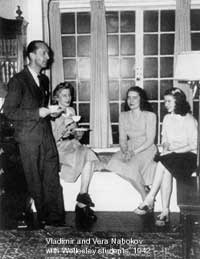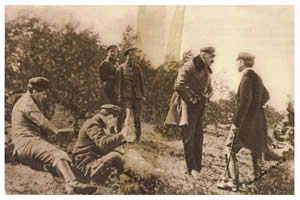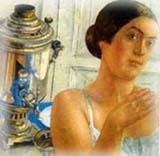The study of Russian literature and language at Wellesley College was introduced by Vladimir Vladimirovich Nabokov (1899-1977) in the early 1940s.
With the upsurge of interest in Russian culture during the WWII alliance between the U.S. and U.S.S.R., demand for courses in Russian literature and language increased nationwide.
 In the fall of 1941, Nabokov was named Resident Lecturer in Comparative Literature at Wellesley College, and moved to Massachusetts after leaving a post at Stanford University. Without an official Wellesley position for 1942-43, Nabokov nonetheless taught an unofficial, non-credit course in elementary Russian for Wellesley students, who paid $10 apiece, in the spring of 1943; he repeated the course the following fall. Wellesley College finally decided to offer a course in elementary Russian for credit, with Nabokov as instructor under a one-year contract, for the 1944-45 academic year. In 1945-46, Nabokov was allowed to add an intermediate course to elementary Russian. A course on Russian poetry in translation was added to the two language courses for fall 1946, and one on Russian prose in translation for spring 1947. This three-course curriculum was repeated in 1947-48, the last year Nabokov taught at Wellesley before starting his post at Cornell in the fall of 1948. [See Brian Boyd, Vladimir Nabokov: The American Years (Princeton: Princeton UP, 1991), pp. 34-5, 48, 60, 65, 69, 88, 108, 115, 122, 129.]
In the fall of 1941, Nabokov was named Resident Lecturer in Comparative Literature at Wellesley College, and moved to Massachusetts after leaving a post at Stanford University. Without an official Wellesley position for 1942-43, Nabokov nonetheless taught an unofficial, non-credit course in elementary Russian for Wellesley students, who paid $10 apiece, in the spring of 1943; he repeated the course the following fall. Wellesley College finally decided to offer a course in elementary Russian for credit, with Nabokov as instructor under a one-year contract, for the 1944-45 academic year. In 1945-46, Nabokov was allowed to add an intermediate course to elementary Russian. A course on Russian poetry in translation was added to the two language courses for fall 1946, and one on Russian prose in translation for spring 1947. This three-course curriculum was repeated in 1947-48, the last year Nabokov taught at Wellesley before starting his post at Cornell in the fall of 1948. [See Brian Boyd, Vladimir Nabokov: The American Years (Princeton: Princeton UP, 1991), pp. 34-5, 48, 60, 65, 69, 88, 108, 115, 122, 129.]
 The College replaced Nabokov with another famous emigre, Wacław Jędrzejewicz (1893-1993), who took charge of the Russian Department starting in 1948-49. A Ukrainian-born Pole, Jędrzejewicz fought in the Polish underground first against tsarist Russia, then against the Soviets in the Soviet-Polish War of 1919-1920, during which he served under Marshal Józef Piłsudski. Between the wars, Jędrzejewicz held several high government posts (including Minister of Education) in Poland and eventually emigrated to the U.S. in 1941. After teaching at Wellesley College and Ripon College (Wisconsin), he retired in the early 1960s, though he continued to publish prolifically on Polish issues. He was promoted in 1992 to the rank of Brigadier General by Lech Wałęsa, and his death in 1993 occasioned a period of national mourning in Poland.
The College replaced Nabokov with another famous emigre, Wacław Jędrzejewicz (1893-1993), who took charge of the Russian Department starting in 1948-49. A Ukrainian-born Pole, Jędrzejewicz fought in the Polish underground first against tsarist Russia, then against the Soviets in the Soviet-Polish War of 1919-1920, during which he served under Marshal Józef Piłsudski. Between the wars, Jędrzejewicz held several high government posts (including Minister of Education) in Poland and eventually emigrated to the U.S. in 1941. After teaching at Wellesley College and Ripon College (Wisconsin), he retired in the early 1960s, though he continued to publish prolifically on Polish issues. He was promoted in 1992 to the rank of Brigadier General by Lech Wałęsa, and his death in 1993 occasioned a period of national mourning in Poland.
At Wellesley, Jędrzejewicz instituted a weekly Russian Table in the dormitory dining halls (1948-49); showed Russian films; pioneered the use of Russian music as a language-teaching tool; introduced Polish, Czech, and Serb literature in the Russian literature survey course (1950-51); taught a not-for-credit course on Polish literature in Polish; and every year campaigned passionately, though fruitlessly, for a major in Russian (starting in 1953-54). After the 1957-58 academic year, Jędrzejewicz left Wellesley. In 1958, he wrote, "My ambition was to organize the Russian Department as a small and modest, but nevertheless serious apparatus of learning and study, which could take adequate place among other modern language departments at Wellesley College."
 In 1958-59, another Pole — Xenia Gąsiorowska — succeded Jędrzejewicz as department head for a single year before returning the University of Wisconsin. Ukrainian-born Ella Pacaluyko Bones, who had studied Russian literature with Nabokov as a Cornell undergraduate in the 1950s, was hired to teach Russian language and literature in translation. In 1959-60, Dr. Bones became head of the department. After the famous "Kitchen Debate" during Vice President Richard Nixon's 1959 visit to Russia, Wellesley students demanded advanced literature courses and Irina Borisova-Morozova Lynch (1921-2007) was hired to teach literature courses entirely in Russian as well as introductory Russian language. Dr. Pacaluyko Bones and Dr. Lynch, with occasional leave-replacements and visiting lecturers (most notably Dimitri Obolensky), would be the Wellesley College Russian Department for the next thirty years. Wacław Jędrzejewicz's dream of a Russian major at Wellesley was finally realized in 1969.
In 1958-59, another Pole — Xenia Gąsiorowska — succeded Jędrzejewicz as department head for a single year before returning the University of Wisconsin. Ukrainian-born Ella Pacaluyko Bones, who had studied Russian literature with Nabokov as a Cornell undergraduate in the 1950s, was hired to teach Russian language and literature in translation. In 1959-60, Dr. Bones became head of the department. After the famous "Kitchen Debate" during Vice President Richard Nixon's 1959 visit to Russia, Wellesley students demanded advanced literature courses and Irina Borisova-Morozova Lynch (1921-2007) was hired to teach literature courses entirely in Russian as well as introductory Russian language. Dr. Pacaluyko Bones and Dr. Lynch, with occasional leave-replacements and visiting lecturers (most notably Dimitri Obolensky), would be the Wellesley College Russian Department for the next thirty years. Wacław Jędrzejewicz's dream of a Russian major at Wellesley was finally realized in 1969.
Upon Dr. Lynch's retirement in 1992, Thomas Hodge was hired, and Adam Weiner succeeded Dr. Bones when she retired in 1994. Senior Lecturer Alla Epsteyn became part of the team in 1998. Over the years, the Russian Department has benefited enormously from the various faculty and staff who have joined the operation from the mid-1990s to the present: administrative assistants Nina Kochergin, Joanne Davenport, and Katie Sango-Jackson; faculty members Yelena Lebedinsky, Elena Semeka-Pankratov, Andrew Swensen, Judith Kalb, Ludmila Lavine, James Lavine, Sarah Bishop, Olga Partan, Yuri Corrigan, Natalie Rouland (Wellesley '00), Sara Pankenier Weld, Molly Blasing, Jason Cieply, and Oleh Kotsyuba. In 2012, a new Language Assistant program was instituted whereby a native speaking instructor became a resident in Russian Corridor, which changed its name to Russian Village (Русская Деревня). The inaugural Russian Language Assistant was Mayya Volchkevich, from Moscow's Russian State University of the Humanities.
To read more about Nabokov at Wellesley, visit Vladimir Nabokov by Amy Gembala and Vladimir Nabokov at Wellesley by Wilma Slaight.
